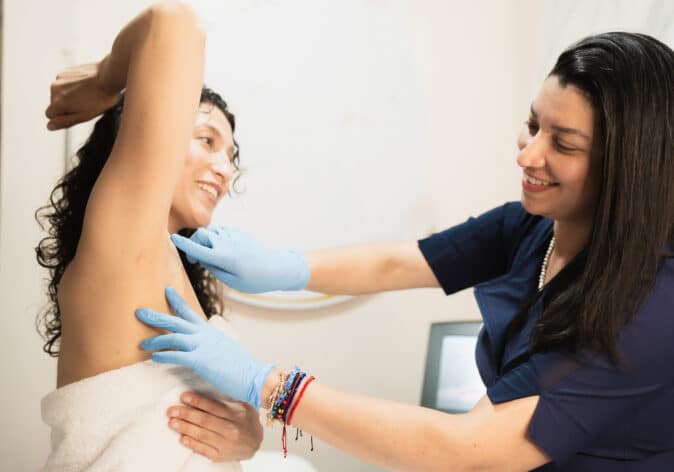Associate Professor Amy McCart Reed holds a PhD in molecular biology from the University of Queensland and has undertaken a series of studies investigating the genomic landscape of certain breast cancer types.
She is passionate about breast cancer research, biobanking, and precision oncology. In addition to her breast cancer research portfolio, she is on the Scientific Advisory Board for Breast Cancer Trials. We spoke with her about lobular prognostic biomarkers and their role in breast cancer diagnoses.
“So, lobular breast cancer is the second most common breast cancer, and it accounts for about 15 percent of all breast cancer diagnoses. But we don’t know as much about lobular breast cancer. For a long time, it’s been sort of sidelined from research.”
“The lobular participants in clinical trials data were not analysed, and so we’re not very clear on how to manage these cases. And currently they’re managed the same as any other breast cancer patients, based on their expression of estrogen receptors or progesterone receptors. And so, there are some aspects of their management that still remain unclear.”
“So, we have been working to try and develop a prognostic test or predictive biomarker test to help us look at the different lobular cases and work out which patients will do well, and which patients are less likely to do well and may need a more aggressive intervention plan.”
How do lobular prognostic biomarkers influence decisions regarding treatment options for breast cancer patients?
“At the moment, the biomarkers that we’re developing are antibody-based biomarkers and we have a provisional patent application submitted and we’re looking to develop a mechanism where we can do two biomarkers staining at the same time that we would do an estrogen receptor stain.”
“And we want to work out from the point of diagnostics whether the lobular samples that we’re looking at have a low risk of progressing and having a poorer outcome or have a high risk. So, at the moment there aren’t any available but we’re working on them.”
Listen to the Podcast
Associate Professor Amy McCart Reed holds a PhD in molecular biology from the University of Queensland. She is on the Scientific Advisory Board for Breast Cancer Trials, and we spoke with her about lobular prognostic biomarkers and their role in breast cancer diagnoses.
How do lobular prognostic biomarkers contribute to personalised medicine approaches in breast cancer treatment?
“These kind of biomarkers for specific breast cancer subtypes are critical in personalizing care. We need to be able to look at an individual patient and work out which patient is likely to respond to which therapy. At the moment, we treat lobular breast cancers the same as an invasive carcinoma of no special type.”
“So, there’s limited precision medicine taking place for this cohort, and we really need to improve on that.”
How are lobular prognostic biomarkers changing the way that breast cancer is managed or treated?
“I see that these kinds of biomarkers are really complementary to traditional approaches and will be a companion diagnostic, which can help to inform new strategies for these patients alongside our existing strategies, which for a number of patients do work very well.”
“At the moment we are validating these biomarkers in independent cohorts from collaborators around the world and should this pan out we really hope to be able to move towards some sort of a clinical trial or an implementation study and then move these biomarkers into the clinic so that we can help get some more equitable precision medicine across breast cancer care in Australia and around the world.”
“I really think that we can be more strategic about who we give which drugs. We have a number of drugs that work very well in the right patient, but at the moment, the side effect burden from a number of these drugs is really quite appalling.”
What are your hopes for the future of breast cancer research?
“We need to be very careful about who we give certain drugs to. And we have the tools to do this, but we don’t really have the mechanism to make it an equitable rollout for everyone. So, I think there’s great scope for improving the drugs that we have and how we prescribe them, but also for developing new drugs and treating each breast cancer patient individually.”
Support Us
Help us to change lives through breast cancer clinical trials research



